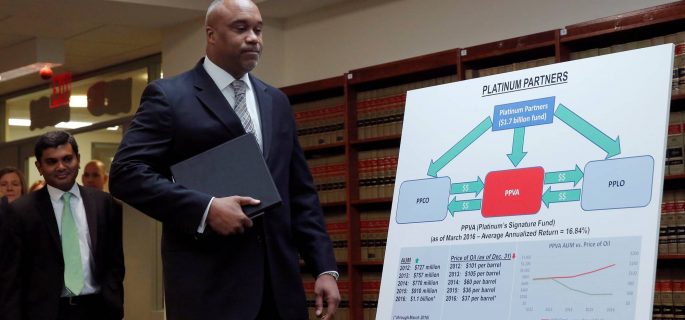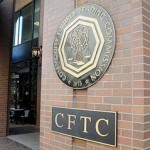Authorities Allege $1 Billion Fraud at Platinum Partners

In June 2014, the founder of hedge fund Platinum Partners sent a panicked email to his partner.
“It can’t go on like this,” wrote Mark Nordlicht, fretting about mounting requests from investors for their money back. “This is code red.”
For two more years Platinum pressed on, until federal prosecutors Monday filed a criminal indictment alleging that Mr. Nordlicht and others operated perhaps the largest fraud since Bernard L. Madoff’s Ponzi scheme. Authorities estimated that $1 billion from more than 600 Platinum investors may have been swindled.
Mr. Nordlicht was arrested Monday, along with Platinum’s former president, and four others, accused of faking the firm’s performance figures to collect a hefty cut of all investment gains and project a veneer of financial stability. All pleaded not guilty Monday and declined to comment.
Brooklyn U.S. Attorney Robert Capers described the scheme as “Ponzi-esque.”
“Platinum Partners held no more value than a tarnished piece of cheap metal,” Mr. Capers said.
Platinum’s collapse caps a stunning fall for a hedge fund that had once boasted of one of the most superlative track records in the hedge-fund world. Its main funds reported no down years and virtually no down months. Mr. Madoff had made similar claims.
Paradoxically, Platinum struggled to attract money from skeptical, deep-pocketed professional investors, instead turning time and again to a tightknit group of fellow observant Jewish businesspeople with whom Platinum’s founders were acquainted socially.
Little did the investors know, however, that Platinum’s business, which the firm said involved making eclectic investments like loans to bankrupt companies and in thinly traded pharmaceutical stocks, was under fire.
In the spring of 2015, Mr. Nordlicht and other Platinum officials “schemed to meet a sudden wave of over $70 million in redemptions,” according to the Securities and Exchange Commission, which Monday filed a parallel civil lawsuit against Mr. Nordlicht and others.
Platinum’s then-president, Uri Landesman, who was arrested Monday, coined a phrase for the moment. As he urged investors to stay put, he sent a note to Mr. Nordlicht, saying “Hail Mary time,” according to the SEC.
Platinum was desperate to keep its investors calm, because Mr. Nordlicht was doubling down on hard-to-sell energy investments despite a steep drop in the price of oil, according to investor documents and people close to the firm. The federal complaint described how Platinum kept the valuation of some such holdings steady in face of evidence that they were close to worthless.
Jeffrey Shulse, a former executive for one of those investments, Black Elk Energy, separately turned himself into authorities in Houston on Monday. An attorney for Mr. Shulse said his client planned to plead not guilty and called the charges “a clear case of overreaching.”
Platinum was launched in 2003 by Mr. Nordlicht, 48 years old, a second-generation commodities-options trader who once had a seat on the New York Mercantile Exchange.
The firm launched with $25 million raised partly by Murray Huberfeld, the 55-year-old son of a kosher restaurateur in the working-class neighborhood of Canarsie in Brooklyn.
Mr. Huberfeld was arrested and charged earlier this year by federal prosecutors in Manhattan in an alleged scheme to bribe the president of the New York City correction officers’ union to funnel $20 million of union money into Platinum. The union declined to comment, and the now-former president has pleaded not guilty and said he didn’t accept bribes.
Mr. Huberfeld also pleaded not guilty to those charges, which stem from a sprawling public-corruption investigation into the union, the New York Police Department, and the fundraising activities of New York City Mayor Bill de Blasio, a Democrat.
Mr. Huberfeld wasn’t named in Monday’s indictment, but a person familiar with the matter said he was the anonymous “Co-Conspirator 1” in the document. His nephew, David Levy, is one of the Platinum executives arrested Monday.
Mr. Levy also worked for a period at Beechwood Re, an investment adviser that Platinum used to “essentially steal investor money,” the SEC said Monday. The Wall Street Journal earlier reported that Platinum’s principals owned a sizable stake of Beechwood, which wasn’t disclosed to Beechwood clients even as the firm directed their money into Platinum’s funds and overlapping investment.
“The complaint makes clear that Beechwood was kept in the dark about what Platinum has been accused of doing,” a Beechwood spokesman said.
Late last year, Platinum formally told investors it wouldn’t be able to cash out all of their money, alarming some of them, said people close to the firm. Messrs. Nordlicht and Huberfeld went on an investor relations blitz, calling up some personally to profess their optimism about Platinum’s financial health, the people said.
Mr. Nordlicht told some that he himself was lending money to Platinum personally, one of the people said.
Concurrently, the finances of Platinum’s flagship fund was becoming dire, according to the SEC complaint.
In July 2015, the fund’s master bank account was overdrawn by $1.5 million, according to the SEC complaint. A principal wired $1.65 million into Platinum’s bank account. That money was then allegedly used to fund $50,000 in payments to two investors.
Platinum also used its second-largest fund to provide cash to the flagship, even though both entities prohibited borrowing from each other for anything other than investments, the SEC complaint said. Investors who put money into the second fund had their money diverted to pay off the flagship’s short-term loans, without their knowledge or consent, the SEC said.
Near year-end, Messrs. Huberfeld and Nordlicht discussed fleeing the U.S. for Israel, according to the indictment.
“Don’t forget books,” Mr. Huberfeld wrote to his partner in an email, the indictment said. “Assume we are not coming back to ny…Take passport.”
They didn’t move there permanently.
In court Monday, Mr. Nordlicht appeared unshaven in a green checkered shirt and jeans. Directed to post a $500,000 bond, Mr. Nordlicht asked his retired father and wife to vouch for it.
The judge asked his wife whether she was now supporting the family. She answered, “I suppose.” The bond was posted.
Source: WSJ





























